Unit 8 Have you read Treasure Island yet? Section A 3a-4c(第2课时)教学课件
文档属性
| 名称 | Unit 8 Have you read Treasure Island yet? Section A 3a-4c(第2课时)教学课件 |
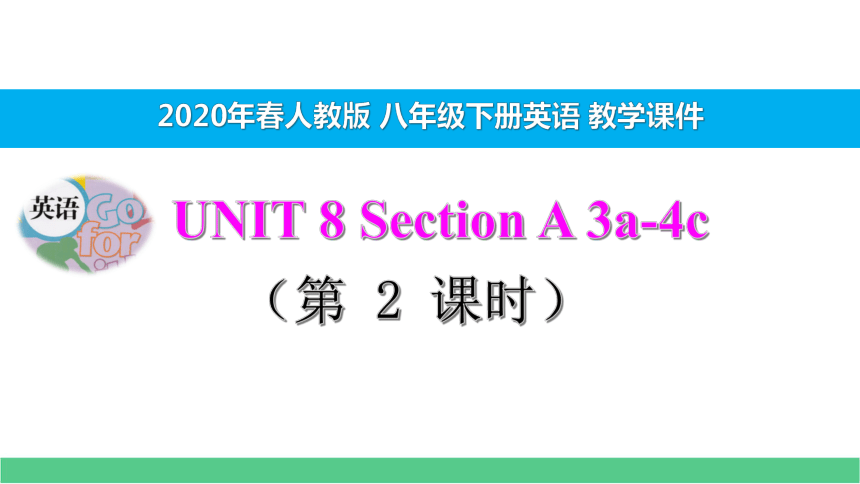
|
|
| 格式 | zip | ||
| 文件大小 | 33.2MB | ||
| 资源类型 | 试卷 | ||
| 版本资源 | 人教新目标(Go for it)版 | ||
| 科目 | 英语 | ||
| 更新时间 | 2020-02-27 00:00:00 | ||
图片预览

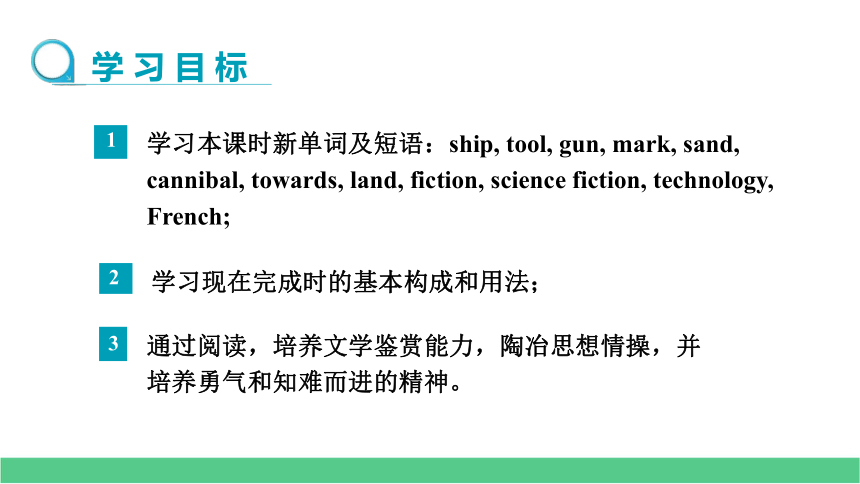
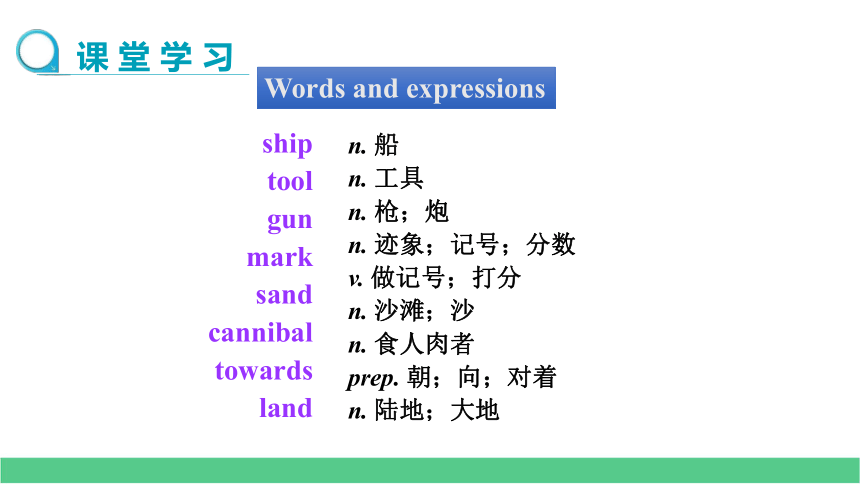


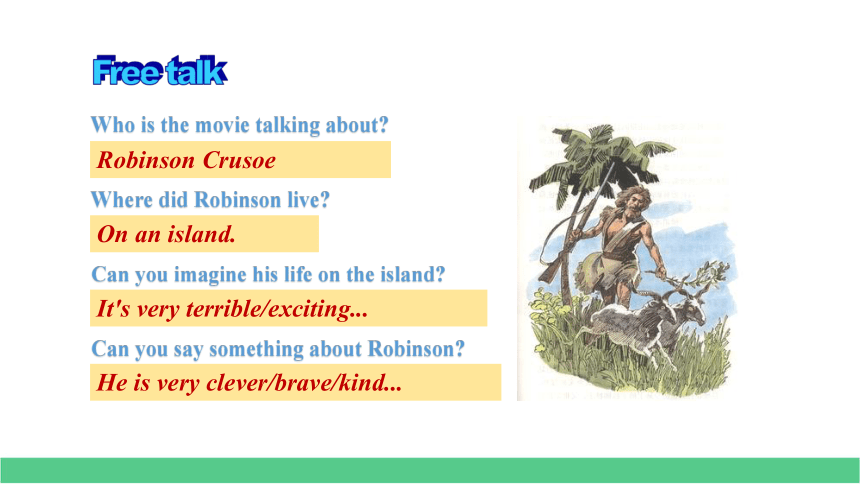
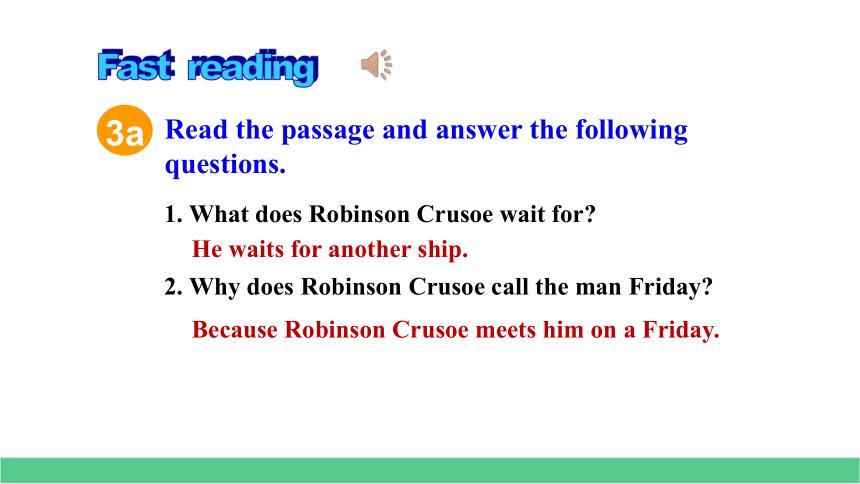
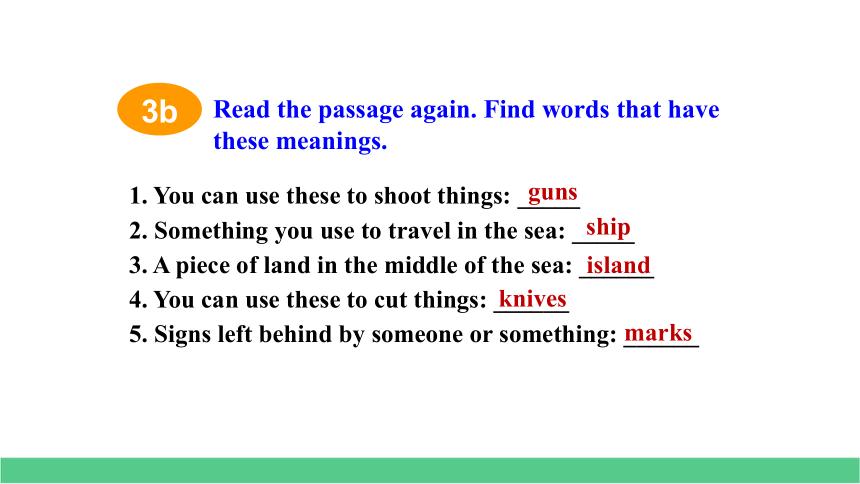
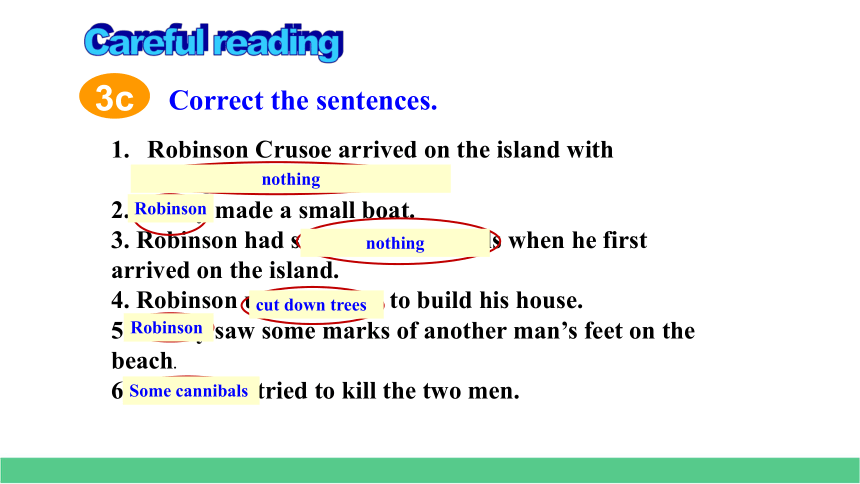
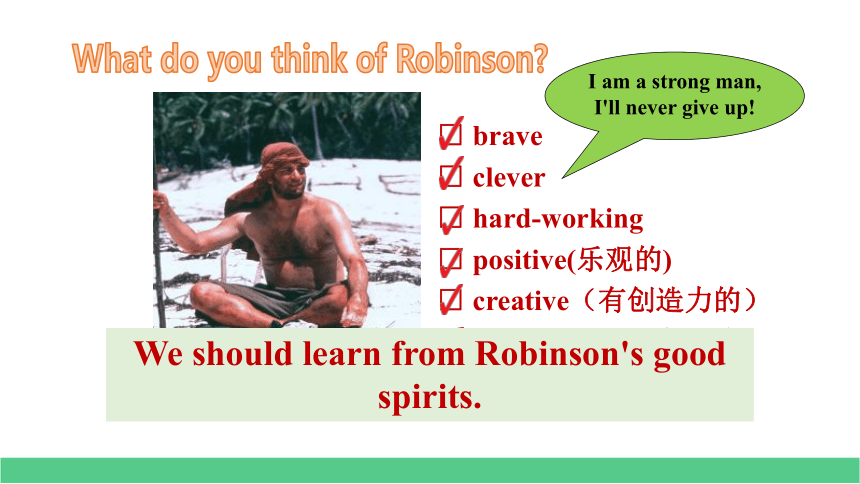
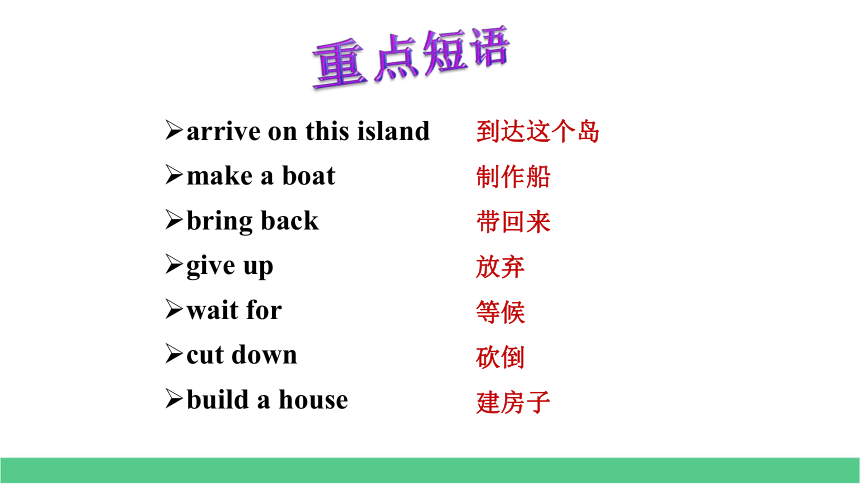
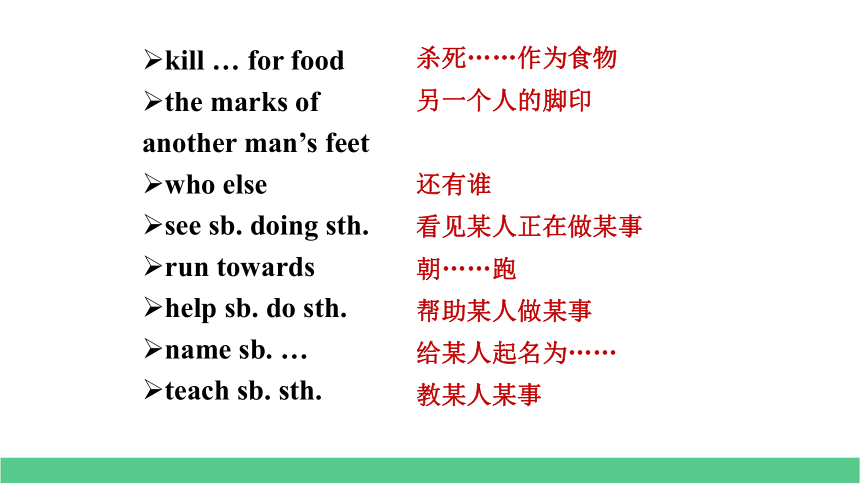
文档简介
课件36张PPT。2020年春人教版 八年级下册英语 教学课件UNIT 8 Section A 3a-4c(第 2 课时)ship
tool
gun
mark
sand
cannibal
towards
landn. 船
n. 工具
n. 枪;炮
n. 迹象;记号;分数
v. 做记号;打分
n. 沙滩;沙
n. 食人肉者
prep. 朝;向;对着
n. 陆地;大地Words and expressions Pre-reading1.Have you read
Robinson Crusoe?2.What do you know
about it? Who is the movie talking about?
Where did Robinson live?
Can you imagine his life on the island?
Can you say something about Robinson?
On an island.Free talk Robinson CrusoeIt's very terrible/exciting...He is very clever/brave/kind...Read the passage and answer the following questions.1. What does Robinson Crusoe wait for?
2. Why does Robinson Crusoe call the man Friday?He waits for another ship.Because Robinson Crusoe meets him on a Friday.3a Fast readingRead the passage again. Find words that have these meanings.1. You can use these to shoot things: _____
2. Something you use to travel in the sea: _____
3. A piece of land in the middle of the sea: ______
4. You can use these to cut things: ______
5. Signs left behind by someone or something: ______gunsshipislandknivesmarks3bCorrect the sentences.Robinson Crusoe arrived on the island with
enough food and drink.
2. Friday made a small boat.
3. Robinson had some food and tools when he first arrived on the island.
4. Robinson used the ship to build his house.
5. Friday saw some marks of another man’s feet on the beach.
6. Robinson tried to kill the two men.nothingRobinsonnothingcut down treesRobinsonSome cannibals3c Careful readingWhat do you think of Robinson? I am a strong man, I'll never give up!□ brave
□ clever
□ hard-working
□ positive(乐观的)
□ creative(有创造力的)
□ adventurous(有冒险
精神的 )
We should learn from Robinson's good spirits.arrive on this island
make a boat
bring back
give up
wait for
cut down
build a house到达这个岛
制作船
带回来
放弃
等候
砍倒
建房子kill … for food
the marks of
another man’s feet
who else
see sb. doing sth.
run towards
help sb. do sth.
name sb. …
teach sb. sth.杀死……作为食物
另一个人的脚印
还有谁
看见某人正在做某事
朝……跑
帮助某人做某事
给某人起名为……
教某人某事1. …had nothing 一无所有
I’m sorry, I have nothing to pay you except
some big bills.
对不起,我只带着大面额的钞票,没有零钱付给你。Language points
2. So I will not give up and I will wait for another ship.wait for 意为“等候;等待;等待某人”。让他在大门口等我们。
Tell him to wait for us at the gate.
学生们在焦急地等待张老师的到来。
The students are waiting for Mr. Zhang anxiously.3. Who else is on my island?else意为“另外; 其他”。常用于以some-, every-, any-和no-开头的单词后或疑问词后。 还有谁参加了聚会?
Who else was at the party?
我们去电影院了, 没到其他地方去。
We went to the cinema and nowhere else. 4. One of them died but the other ran towards my house.one…the other…表示 “(两者中的)一个……另一个……”。 他先举起一只胳膊,然后举起另一只。
He raised one arm and then the other.
我有两个新书包,一个是红色的,另一个是蓝色的。
I have two schoolbags. One is red, and the other is blue.Grammar Focus1. Have you visited the Great Wall yet ?the Great Wall Yes, I have.
No, I haven't.2.—Have you read Alice in Wonderland yet?—Yes, I have. —No, I haven’t. I have already read it. I haven’t read it yet. Grammar Focus1. 现在完成时含义:
表示过去发生或已经完成的某一动作对现在造成的影响或结果,或从过去开始一直延续到现在的动作或保存的状态。
现在完成时(一) 现在完成时的谓语构成
have /has + 动词的过去分词助动词否定haven’t
hasn’t疑问Have you…?
Has he/she…?2.现在完成时的结构: 主语+ have / has + 动词的过去分词
3.现在完成时的句式:
肯定句:主语 + have / has +动词的过去分词(+ 其他)
否定句:主语 + have / has + not +动词的过去分词(+ 其他)
一般疑问句:have/ has + 主语 +动词的过去分词(+其他)
答语:Yes, 主语+have./ No, 主语+ haven’t.
或 Yes, 主语+ has. / No, 主语+hasn’t. 特殊疑问句:
特殊疑问词 (不是句子主语) + have / has+ 主语+动词的过去分词 (+ 其他)?
2) 特殊疑问词(是句子主语)+have / has+动词的过去分词(+ 其他)?4. 时间状语:
常与下列时间状语连用:just , already, yet, ever, never,
before, several times。—Have you had lunch yet? ???? 你吃了午饭吗? —Yes, I’ve just had it. ???? 是的, 我刚刚吃过。already和yet的不同:
already一般用于肯定句中, yet一般用于否定句或疑问句中。
We have already finished our homework. 我们已完成家庭作业了。
They haven’t finished their homework yet. 他们还没有完成家庭作业。???注意:Use the words in brackets to complete the conversations.4a1. A: Would you like something to drink?
B: No, thanks. _______________________ (just / drink some tea)
2. A: I heard you lost your key.
____________________? (find)
B: No, not yet.I’ve just drunk some tea.Have you found it yet3. A: Do you know when Tom is leaving?
B: ________________________.
(already/ leave)
A: When ___________________? (leave)
B: This morning.
4. A: Is your sister going to the movies
with us tonight?
B: No. __________________________.
(already/ see the film)He has already leftdid he leaveShe has already seen the film5. A: What do your parents think about
our plan?
B: I __________________. (not/ tell
them/yet)haven’t told them yet Fill in the blanks with the correct forms of the words
in the brackets.
Sally ____ (love) reading. In the morning she reads the
newspaper and in the evening she reads books. She ___
already ____ (read) more than 100 different books. Her
favorite kind of books is science fiction. She is interested
in science and technology and loves to imagine what the
world ______ (be) like in 50 years. loveshasreadwill be4bPractice对……感兴趣 She _______ (finish) reading a book about robots last week and _________ (write) a book report about it next week for her French class. Every time she is in the library, Sally looks at the many books she __________ (not read) yet and she can’t wait to read them.finishedwill writehasn’t read4cComplete the chart with information about you and a friend.Pair work单项填空
1. — China develops so fast.
— That’s true. It _____ a lot already.
A. changes B. changed
C. will change D. has changed
2. Julia isn’t going to the cinema with us because she ______ the film.
A. sees?? ?? B. saw?? ?? C. will see??? ?? D. has seen DD3. — I’d like to introduce my best friend to you, Peter.
— Thank you, Lucy. But we _____ already.
A. meet B. met
C. will meet D. have met
4. —Kitty, will you go to see the film Cold Mountain
this evening?
—No, I won’t. I ____ it already.
A. saw B. have seen
C. see D. will seeDB5. Our school is having a sports meeting. Someone ____
here already.
A. arrived B. have arrived
C. has arrived D. arrive
6. — ___ you ___ the movie?
— Not yet. I’ll see it this Sunday.
A. Did, see B. Do, see
C. Have, seen D. Does, see
CC Review the new words and expressions.
2. Make sentences using the Present perfect tense with already and yet.
(at least 10 sentences)Homework
tool
gun
mark
sand
cannibal
towards
landn. 船
n. 工具
n. 枪;炮
n. 迹象;记号;分数
v. 做记号;打分
n. 沙滩;沙
n. 食人肉者
prep. 朝;向;对着
n. 陆地;大地Words and expressions Pre-reading1.Have you read
Robinson Crusoe?2.What do you know
about it? Who is the movie talking about?
Where did Robinson live?
Can you imagine his life on the island?
Can you say something about Robinson?
On an island.Free talk Robinson CrusoeIt's very terrible/exciting...He is very clever/brave/kind...Read the passage and answer the following questions.1. What does Robinson Crusoe wait for?
2. Why does Robinson Crusoe call the man Friday?He waits for another ship.Because Robinson Crusoe meets him on a Friday.3a Fast readingRead the passage again. Find words that have these meanings.1. You can use these to shoot things: _____
2. Something you use to travel in the sea: _____
3. A piece of land in the middle of the sea: ______
4. You can use these to cut things: ______
5. Signs left behind by someone or something: ______gunsshipislandknivesmarks3bCorrect the sentences.Robinson Crusoe arrived on the island with
enough food and drink.
2. Friday made a small boat.
3. Robinson had some food and tools when he first arrived on the island.
4. Robinson used the ship to build his house.
5. Friday saw some marks of another man’s feet on the beach.
6. Robinson tried to kill the two men.nothingRobinsonnothingcut down treesRobinsonSome cannibals3c Careful readingWhat do you think of Robinson? I am a strong man, I'll never give up!□ brave
□ clever
□ hard-working
□ positive(乐观的)
□ creative(有创造力的)
□ adventurous(有冒险
精神的 )
We should learn from Robinson's good spirits.arrive on this island
make a boat
bring back
give up
wait for
cut down
build a house到达这个岛
制作船
带回来
放弃
等候
砍倒
建房子kill … for food
the marks of
another man’s feet
who else
see sb. doing sth.
run towards
help sb. do sth.
name sb. …
teach sb. sth.杀死……作为食物
另一个人的脚印
还有谁
看见某人正在做某事
朝……跑
帮助某人做某事
给某人起名为……
教某人某事1. …had nothing 一无所有
I’m sorry, I have nothing to pay you except
some big bills.
对不起,我只带着大面额的钞票,没有零钱付给你。Language points
2. So I will not give up and I will wait for another ship.wait for 意为“等候;等待;等待某人”。让他在大门口等我们。
Tell him to wait for us at the gate.
学生们在焦急地等待张老师的到来。
The students are waiting for Mr. Zhang anxiously.3. Who else is on my island?else意为“另外; 其他”。常用于以some-, every-, any-和no-开头的单词后或疑问词后。 还有谁参加了聚会?
Who else was at the party?
我们去电影院了, 没到其他地方去。
We went to the cinema and nowhere else. 4. One of them died but the other ran towards my house.one…the other…表示 “(两者中的)一个……另一个……”。 他先举起一只胳膊,然后举起另一只。
He raised one arm and then the other.
我有两个新书包,一个是红色的,另一个是蓝色的。
I have two schoolbags. One is red, and the other is blue.Grammar Focus1. Have you visited the Great Wall yet ?the Great Wall Yes, I have.
No, I haven't.2.—Have you read Alice in Wonderland yet?—Yes, I have. —No, I haven’t. I have already read it. I haven’t read it yet. Grammar Focus1. 现在完成时含义:
表示过去发生或已经完成的某一动作对现在造成的影响或结果,或从过去开始一直延续到现在的动作或保存的状态。
现在完成时(一) 现在完成时的谓语构成
have /has + 动词的过去分词助动词否定haven’t
hasn’t疑问Have you…?
Has he/she…?2.现在完成时的结构: 主语+ have / has + 动词的过去分词
3.现在完成时的句式:
肯定句:主语 + have / has +动词的过去分词(+ 其他)
否定句:主语 + have / has + not +动词的过去分词(+ 其他)
一般疑问句:have/ has + 主语 +动词的过去分词(+其他)
答语:Yes, 主语+have./ No, 主语+ haven’t.
或 Yes, 主语+ has. / No, 主语+hasn’t. 特殊疑问句:
特殊疑问词 (不是句子主语) + have / has+ 主语+动词的过去分词 (+ 其他)?
2) 特殊疑问词(是句子主语)+have / has+动词的过去分词(+ 其他)?4. 时间状语:
常与下列时间状语连用:just , already, yet, ever, never,
before, several times。—Have you had lunch yet? ???? 你吃了午饭吗? —Yes, I’ve just had it. ???? 是的, 我刚刚吃过。already和yet的不同:
already一般用于肯定句中, yet一般用于否定句或疑问句中。
We have already finished our homework. 我们已完成家庭作业了。
They haven’t finished their homework yet. 他们还没有完成家庭作业。???注意:Use the words in brackets to complete the conversations.4a1. A: Would you like something to drink?
B: No, thanks. _______________________ (just / drink some tea)
2. A: I heard you lost your key.
____________________? (find)
B: No, not yet.I’ve just drunk some tea.Have you found it yet3. A: Do you know when Tom is leaving?
B: ________________________.
(already/ leave)
A: When ___________________? (leave)
B: This morning.
4. A: Is your sister going to the movies
with us tonight?
B: No. __________________________.
(already/ see the film)He has already leftdid he leaveShe has already seen the film5. A: What do your parents think about
our plan?
B: I __________________. (not/ tell
them/yet)haven’t told them yet Fill in the blanks with the correct forms of the words
in the brackets.
Sally ____ (love) reading. In the morning she reads the
newspaper and in the evening she reads books. She ___
already ____ (read) more than 100 different books. Her
favorite kind of books is science fiction. She is interested
in science and technology and loves to imagine what the
world ______ (be) like in 50 years. loveshasreadwill be4bPractice对……感兴趣 She _______ (finish) reading a book about robots last week and _________ (write) a book report about it next week for her French class. Every time she is in the library, Sally looks at the many books she __________ (not read) yet and she can’t wait to read them.finishedwill writehasn’t read4cComplete the chart with information about you and a friend.Pair work单项填空
1. — China develops so fast.
— That’s true. It _____ a lot already.
A. changes B. changed
C. will change D. has changed
2. Julia isn’t going to the cinema with us because she ______ the film.
A. sees?? ?? B. saw?? ?? C. will see??? ?? D. has seen DD3. — I’d like to introduce my best friend to you, Peter.
— Thank you, Lucy. But we _____ already.
A. meet B. met
C. will meet D. have met
4. —Kitty, will you go to see the film Cold Mountain
this evening?
—No, I won’t. I ____ it already.
A. saw B. have seen
C. see D. will seeDB5. Our school is having a sports meeting. Someone ____
here already.
A. arrived B. have arrived
C. has arrived D. arrive
6. — ___ you ___ the movie?
— Not yet. I’ll see it this Sunday.
A. Did, see B. Do, see
C. Have, seen D. Does, see
CC Review the new words and expressions.
2. Make sentences using the Present perfect tense with already and yet.
(at least 10 sentences)Homework
同课章节目录
- Unit 1 What's the matter?
- Section A
- Section B
- Unit 2 I'll help to clean up the city parks.
- Section A
- Section B
- Unit 3 Could you please clean your room?
- Section A
- Section B
- Unit 4 Why don't you talk to your parents?
- Section A
- Section B
- Unit 5 What were you doing when the rainstorm came
- Section A
- Section B
- Review of Units 1-5
- Unit 6 An old man tried to move the mountains.
- Section A
- Section B
- Unit 7 What's the highest mountain in the world?
- Section A
- Section B
- Unit 8 Have you read Treasure Island yet?
- Section A
- Section B
- Unit 9 Have you ever been to a museum?
- Section A
- Section B
- Unit 10 I've had this bike for three years.
- Section A
- Section B
